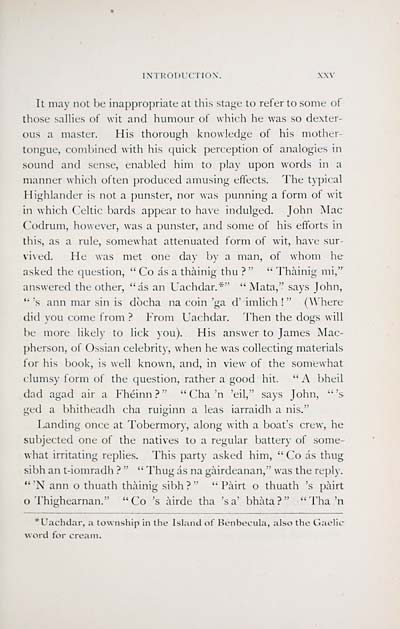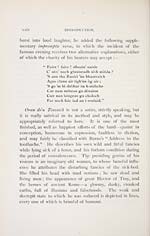Hew Morrison Collection > Poems and songs of John MacCodrum, Archibald MacDonald, and some of the minor Uist bards
(43)
Download files
Complete book:
Individual page:
Thumbnail gallery: Grid view | List view

It nia\- not \k- inappropriate at thi^ sta_i;r to refer to some of
those sallies of wit and humour of whirh he was so dexter-
ous a master. His thorough knowledge of his mother-
tongue, combined with his (juick perception of analogies in
seiund and sense, enabled him to play upon words in a
manner which often produced amusing effects. The typical
Highlander is not a punster, nor was punning a form of wit
in which Celtic bards appear to ha\e indulged. John Mac
("odrum, however, was a punster, and some of his efforts in
this, as a rule, somewhat attenuated form of wit, have sur-
vi\ed. He was met one day by a man, of whom he
asked the (luestion, " Co as a thainig thu ? " " Thàinig mi,"
answered the other, "as an Uachdar.*'' " Mata," says John,
'• 's ann mar sin is docha na coin 'ga d' imlich ! " (^Vhere
did you come from ? From Uachdar. Then the dogs will
be more likely to lick )'ou). His answer to James Mac-
pherson, of Ossian celebrity, when he was collecting materials
for his book, is well known, and, in view of the somewhat
clumsy form of the question, rather a good hit. "A bheil
dad agad air a Fheinn ? " " Cha 'n 'eil," says John, '• 's
ged a bhitheadh cha ruiginn a leas iarraidh a nis."
Landing once at Tobermory, along with a boat's crew, he
subjected one of the natives to a regular battery of some-
what irritating replie.s. This party asked him, " Co as thug
sibh an t-iomradh ? " " Thug as na gàirdeanan," was the reply.
" 'N ann o thuath thainig sibh ? " " Pàirt o thuath 's pàirt
o Thighearnan." "Co 's àirde tha 'sa' bhàta?" "Tha'n
*Uachdar, ;i township in the Island of Benhociila, also the Gaelic
woi-d for cream.
those sallies of wit and humour of whirh he was so dexter-
ous a master. His thorough knowledge of his mother-
tongue, combined with his (juick perception of analogies in
seiund and sense, enabled him to play upon words in a
manner which often produced amusing effects. The typical
Highlander is not a punster, nor was punning a form of wit
in which Celtic bards appear to ha\e indulged. John Mac
("odrum, however, was a punster, and some of his efforts in
this, as a rule, somewhat attenuated form of wit, have sur-
vi\ed. He was met one day by a man, of whom he
asked the (luestion, " Co as a thainig thu ? " " Thàinig mi,"
answered the other, "as an Uachdar.*'' " Mata," says John,
'• 's ann mar sin is docha na coin 'ga d' imlich ! " (^Vhere
did you come from ? From Uachdar. Then the dogs will
be more likely to lick )'ou). His answer to James Mac-
pherson, of Ossian celebrity, when he was collecting materials
for his book, is well known, and, in view of the somewhat
clumsy form of the question, rather a good hit. "A bheil
dad agad air a Fheinn ? " " Cha 'n 'eil," says John, '• 's
ged a bhitheadh cha ruiginn a leas iarraidh a nis."
Landing once at Tobermory, along with a boat's crew, he
subjected one of the natives to a regular battery of some-
what irritating replie.s. This party asked him, " Co as thug
sibh an t-iomradh ? " " Thug as na gàirdeanan," was the reply.
" 'N ann o thuath thainig sibh ? " " Pàirt o thuath 's pàirt
o Thighearnan." "Co 's àirde tha 'sa' bhàta?" "Tha'n
*Uachdar, ;i township in the Island of Benhociila, also the Gaelic
woi-d for cream.
Set display mode to: Large image | Transcription
Images and transcriptions on this page, including medium image downloads, may be used under the Creative Commons Attribution 4.0 International Licence unless otherwise stated. ![]()
| Early Gaelic Book Collections > Hew Morrison Collection > Poems and songs of John MacCodrum, Archibald MacDonald, and some of the minor Uist bards > (43) |
|---|
| Permanent URL | https://digital.nls.uk/81340279 |
|---|
| Description | A selection of items from a collection of 320 volumes and 30 pamphlets of literary and religious works in Scottish Gaelic. From the personal library of Hew Morrison, the first City Librarian of Edinburgh. |
|---|
| Description | Selected items from five 'Special and Named Printed Collections'. Includes books in Gaelic and other Celtic languages, works about the Gaels, their languages, literature, culture and history. |
|---|

